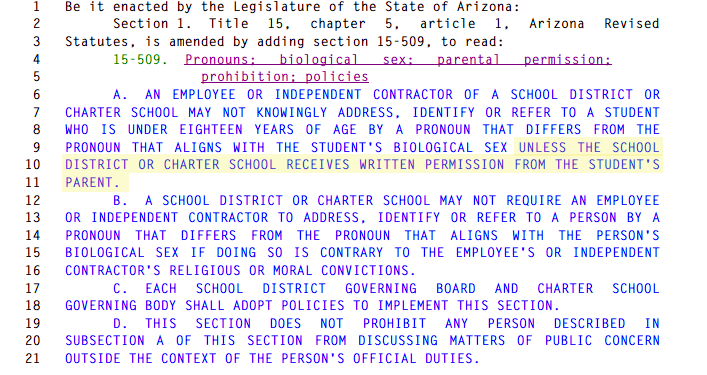The Arizona state Senate Education Committee met Wednesday to consider SB 1001, The Given Name Act, a one-page, 21-line bill that states that any individual involved in the Arizona public education system would be required to use the pronoun associated with a student’s biological sex unless the student’s public school or charter school received other instructions from the student’s parent or parents.
No public or charter school staff member, full time or contractor, would be able to use alternative pronouns for a student without the written permission of the student’s parents.
The legislation would reinforce parents’ ultimate authority in deciding what names their children should and should not be called by staff members, providing a stopgap via parental approval before public districts attempt to treat or affirm gender dysphoria with only the minor’s limited understanding of what they are going through.
State Sen. John Kavanagh, Scottsdale Republican, the sponsor of SB 1001, said that if a child had serious psychological distress as a result of the gender dysphoria he or she was dealing with, then parents need to be alerted immediately so that the child can be given immediate medical and psychological care parents deem necessary.
Kavanagh disputed the common counterargument that many parents would be unsupportive and would therefore be a danger to their “transgender child.”
“The vast majority of parents will want to help their child,” he said, “What a horrible condemnation of the average American parent” to suggest otherwise. He added that Child Protective Services was still obligated, as always, to investigate any concerns of child abuse.
At no time during the committee hearing was Kavanagh’s concern for the high rate of student-suicide correlation addressed by Democratic members.
State Sen. Sally Ann Gonzales, Tucson Democrat, said, “For lots of indigenous children, their names were changed without parental permission—Maria got changed to Mary, Roberto got changed to Robert. I think that’s wrong for that to be happening. I’m not sure what the intent is for allowing … contractors and employers also not to say their names.”
Kavanagh responded that the bill would allow students to go by nicknames.
State Sen. Christine Marsh, Phoenix Democrat, suggested that the bill would go against the rights of parents who might agree with a child wanting different pronouns. “What if the parent agrees to a child having alternative pronouns?” she asked.
Kavanagh countered by citing the first sentence of his bill, which states that parental permission would allow a child to go by whatever pronouns the parent wishes.
Marsh took issue with the second portion of the bill, which states that a teacher or contractor could not be required to use a student’s pronouns, protecting their religious and moral liberties. She said that as a teacher for 33 years, she never had to fall back on “religious beliefs” as a standard for how she would respond to a student. “Are there other examples or situations in which a teacher’s religious beliefs override the parent’s?” she asked.
Kavanagh responded with an example of a Jewish or Muslim cafeteria worker being exempt from having to serve pork to students at school lunches. He also cited dress code considerations for students of different religions. After providing those examples, Kavanagh asked whether Marsh would agree with him that parents should be notified of potential mental health issues associated with gender dysphoria.
“No, I don’t agree, I just want the hypocrisy of the bill to be pointed out,” Marsh replied.
Several testimonials were offered by concerned parents, students, and activists, both for and against the bill.
One educator from Scottsdale praised the bill, claiming that as a Jew, she has religious objections to using pronouns or names that conflict with a student’s biological sex.
One activist claimed that parents should be involved and be aware of what their kids are going through, but suggested that students should be allowed to decide when their parents are ready to find out about it.
One critical point ignored by those opposing the bill is the inability of a minor under severe mental distress to safely self-treat gender dysphoria or any severe mental health issue or trauma. Encouraging minors to decide how best to treat themselves sets a dangerous precedent—and risks a very real threat of suicide or self-harm without the parent having an opportunity to aid his or her child.
One transgender advocate claimed that “no one commits suicide because they are gender dysphoric,” but implied that bullying was the cause.
While 20.2% of students claim to have been bullied, according to the National Center for Education Statistics, 8.9% have admitted attempting suicide. In contrast, while 51% of transgender individuals have claimed to be victims of bullying, 40% of transgender individuals admitted attempting suicide.
One opponent of the bill called Kavanagh “Senator Coward,” during his testimony, to which Kavanagh quipped, “You’re free to call me that [under this bill], as long as you get written permission from my parents.”
With only a one-seat advantage on the Senate Education Committee, Republicans will likely revise The Given Name Act and clarify a few points of language via amendments over the next several weeks.
Have an opinion about this article? To sound off, please email letters@DailySignal.com and we’ll consider publishing your edited remarks in our regular “We Hear You” feature. Remember to include the url or headline of the article plus your name and town and/or state.
The post Arizona Senate Panel Debates Parental Rights’ School ‘Pronouns’ Bill appeared first on The Daily Signal.
The Arizona state Senate Education Committee met Wednesday to consider SB 1001, The Given Name Act, a one-page, 21-line bill that states that any individual… Read More
The post Arizona Senate Panel Debates Parental Rights’ School ‘Pronouns’ Bill appeared first on The Daily Signal.











